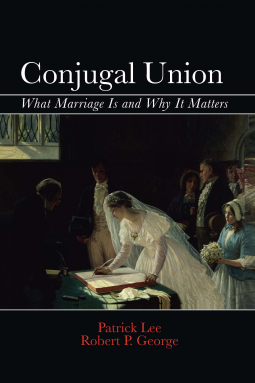
Conjugal Union
What Marriage Is and Why It Matters
by Patrick Lee , Robert P. George
This title was previously available on NetGalley and is now archived.
Send NetGalley books directly to your Kindle or Kindle app
1
To read on a Kindle or Kindle app, please add kindle@netgalley.com as an approved email address to receive files in your Amazon account. Click here for step-by-step instructions.
2
Also find your Kindle email address within your Amazon account, and enter it here.
Pub Date Sep 15 2014 | Archive Date Sep 01 2014
Description
This book defends the conjugal view of marriage. Patrick Lee and Robert P. George argue that marriage is a distinctive type of community: the union of a man and a woman who have committed to sharing their lives on every level of their beings (bodily, emotionally, and spiritually) in the kind of union that would be fulfilled by conceiving and rearing children together. The comprehensive nature of this union, and its intrinsic orientation to procreation as its natural fulfillment, distinguishes marriage from other types of community and provides the basis for the norms of marital exclusivity and permanence. Lee and George detail how the basic moral norms regarding sexual acts follow from the ethical requirement to respect the good of marriage and explain how the law should treat marriage, given its conjugal nature, examining both the same-sex-marriage issue and civil divorce.
Advance Praise
No Advance Praise Available
No Advance Praise Available
Marketing Plan
Advance reading copies available
National print, broadcast, digital media campaign
Social media promotion on Facebook and Twitter
Advance reading copies available
National print, broadcast, digital media campaign
Social media promotion on Facebook and Twitter
Available Editions
| EDITION | Paperback |
| ISBN | 9781107670556 |
| PRICE | $22.99 (USD) |
Average rating from 1 member
Featured Reviews
 Paul M, Reviewer
Paul M, Reviewer
Hardly a week goes by that same-sex marriage (SSM) doesn't make the news. Unfortunately, Christians have done a poor job of holding up traditional marriage as society's norm. As public opinion sways in favor of approval of SSM, Christians will soon find themselves in the minority as they defend traditional marriage. To answer this lack, Patrick Lee and Robert P. George have written Conjugal Union: What Marriage is and Why It Matters. This is not a book about SSM. This is a book about marriage, an explanation of why marriage is, by definition, the union of one man and one woman.
Over the last couple of generations, marriage and sex have been coarsened and cheapened. For many, sex has become "just a fun thing to do, without serious meaning or consequences." And with the rise of "no-fault divorce," divorce has become cheaper and easier and thus more common. Both authors are conservative Catholics, and surely that perspective colors their thinking, but they argue from reason and natural law; they "do not presuppose here any revealed source of truth."
Their argument is carefully explained. Their reasoning took me back to my years as a philosophy major. The crux is this: "sexual intercourse is a unitary action in which the male and female complete one another and become biologically one, a single organism with respect to this function." Same-sex partners, "whatever the intensity of their emotional bond . . . cannot marry, simply because they cannot form together the kind of union marriage is." The good of the marital union is violated in any "nonmarital sexual acts" because they "involve . . . a depersonalization of the bodily, sexual person."
When the state gets involved in defining marriage, the state is attempting to redefine it as "emotional connection, the exchange of sexual pleasure, and shared housekeeping," thus "abolishing marriage and replacing it with some other sort of arrangement--sexual-romantic companionship or domestic partnership to which the label 'marriage' is then reassigned." Denying a same-sex couple the right to marry doesn't even make sense: "If Jones and Smith are denied a license to do X, their right was violated only if what they proposed to do really was X. The right or liberty to marry is fundamental, but it is a right to marry, not a right to the state's declaration that one's sexual relationship--which may be of various contours--is marriage."
I think Lee and George make an excellent case. The very definition of marriage is at stake. A sophisticated defender of SSM would have a hard time poking holes in the logic and conclusions of their arguments. Some may, however, object to some of their premises, thus rejecting their conclusions. All in all, Conjugal Union is a valuable resource for those who want a thoughtful, logical, non-theological defense of traditional marriage.
Thanks to NetGalley and the publisher for the complimentary electronic review copy!



